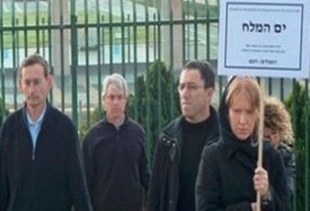
heavy criticism from environmental activists and MK Dov Khenin (Hadash), the government on Sunday approved the agreement reached last week between the Finance Ministry and Israel Chemicals, which stipulates the division of costs toward a full salt harvest of the Dead Sea’s southern portion.
Under the agreement, Israel Chemicals unit Dead Sea Works will contribute NIS 3.04 billion – 80 percent of the total cost of the project.
The state will fund the remaining NIS 760m., of which NIS 337m. is its share of the current value of a $30m. dividend it withdrew in 1992 to finance the sea’s protection. The state’s share of potash sales will rise from 5% to 10%, with the extra royalties to be designated to a Dead Sea rehabilitation fund.
Environmental activists and various politicians slammed the cabinet’s decision to approve the agreement, charging that the royalty figures were way too low.

MK Khenin during a protest for the Dead Sea rehabilitation in Jerusalem, near the Knesset (Photo: Friends of the Earth – Middle East)
The Israel Union for Environmental Defense (IUED), along with the Movement for Quality Government, has pledged to fight against the government’s decision in the High Court. “The government support for this agreement constitutes/ is a severe blow to public interest at large, and the approval of the continued exploitation of the Dead Sea resources in insignificant payment sums that do not reflect public ownership of the resource,” said IUED Executive Director Amit Bracha.
The two groups had already sent a letter to cabinet officials a few days prior to the vote, warning them that if they approved the agreement the groups would take legal action. “Unfortunately, the government chose to support the agreement that was made far from the public’s watchful eye, behind closed doors and based on false assumptions,” Bracha said. “The decision to accept the agreement is an extremely unreasonable decision and is based on a disproportionate agreement that contradicts the principle of distributive environmental justice.”
MK Khenin charged the government with abandoning the Dead Sea to the mercy of tycoons. The royalty levels, he said, are far less than what they should be, lower even than those charged to natural gas developers, Khenin argued. Royalties should actually be higher among Dead Sea enterprises, as their activities do not require the same types of risks as does natural gas exploration, Khenin said. With the ever-worsening environmental threats on the Dead Sea, there is an urgent need to enact legislation that will protect the dwindling resource, he said.
To accomplish this task, he called for an increase in public pressure on the government to remove its opposition to his and IUED’s comprehensive Dead Sea rehabilitation bill during next week’s cabinet meeting – a bill that the cabinet had initially rejected at a first vote over a month ago.
Likewise, Friends of the Earth Middle East Israel Director Gidon Bromberg said there was “no achievement” in raising the royalties to 10% since this was actually the amount determined by the government in the 1960s, though never enforced. While Bromberg praised the government for requiring Israel Chemicals to pay the brunt of the salt harvest – adhering to the “polluter pays” principle – he criticized the Finance Ministry for making such a deal “in the dark, away from public view.” Urging cabinet members to vote in favor of Khenin’s proposed bill next week, he added, “Only legislation that offers comprehensive solutions to the distress of the Dead Sea will save the dying sea.”
Related:
Aavaazlaunches web campaign to pass Khenins dead sea bill
MK Khenin the Dead Sea is in a severe condition of dehydration and destruction
HADASH launches Dead Sea protection bill in Knesset


